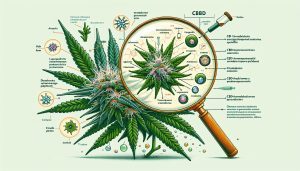Cannabidiol (CBD) is a non-psychoactive component found in the cannabis plant. In recent years, it has gained popularity due to its multiple health benefits and lack of harmful side effects of THC. These benefits include relief from chronic pain, anxiety, inflammation and other neurological disorders.
Recently, some studies have looked at the effects of CBD on blood circulation and its potential ability to thin the blood. In this article, we will discuss the results of this research and find out if CBD does indeed have anticoagulant properties.
Sommaire
ToggleThe possible blood clotting effects of CBD
Before looking at the main scientific studies suggesting this hypothesis, it is essential to understand how the blood clotting process works. Coagulation is a complex mechanism involving several factors related to the coagulation system. Coagulation is necessary to stop bleeding when an injury occurs and prevent internal bleeding.
In certain circumstances, excessive or inappropriate blood clotting can lead to health problems, such as blood clots, phlebitis, pulmonary embolism, or stroke. Thus, the search for natural alternatives to regulate the coagulation system and prevent these complications becomes significant.
CBD and its ability to influence blood circulation
Various researches have been conducted to study the effects of CBD on blood circulation. Here are some results that could support the hypothesis that cannabidiol thins the blood:
- Vasodilator effect: CBD can act as a vasodilator by dilating blood vessels, facilitating blood flow and reducing blood pressure. This action could also contribute to better oxygenation of organs and tissues.
- Anti-inflammatory: Chronic inflammation can lead to health problems associated with clotting, such as blood clots. Due to its anti-inflammatory properties, CBD can help reduce inflammation and promote healthy blood circulation.
- Inhibition of blood platelets: Platelets are responsible for forming blood clots when they clump together. A study carried out in 2017 showed that CBD had the ability to inhibit certain functions of platelets, preventing their aggregation and thus reducing the risk of blood clots.
However, it should be noted that the results of these studies are still preliminary and do not allow us to conclude with certainty that CBD actually acts as a blood thinner. Further clinical research is needed to validate these hypotheses.
How to use CBD as a natural anticoagulant?
If you are interested in using CBD for its potential blood thinning effects, there are several options available to you. Here are some tips on how to incorporate CBD into your health routine:
- Choose the right shape: CBD comes in various forms, such as oils, capsules, balms or e-liquids. Each product has its advantages and disadvantages, so it is important to choose the one that best suits your personal needs and preferences.
- Adapt the dosage: The dosage of CBD depends on several factors, such as age, weight, individual metabolism and the cannabidiol concentration of the product used. It is advisable to start with a low dose and gradually increase until you find the optimal amount for your body.
- Consult a healthcare professional: Before you start taking CBD to improve your blood circulation, it is recommended to consult a doctor or healthcare professional for personalized advice. This is especially important if you are already taking blood thinning medications or other treatments that may interact with CBD.
Side effects and precautions to take with CBD
CBD is generally well tolerated by the body, however some people may experience side effects such as dry mouth, dizziness, drowsiness or diarrhea. To minimize these risks, it is recommended to follow the tips mentioned above when using cannabidiol.
In addition, it is crucial to inform your doctor if you decide to consume CBD for your health, especially if you are undergoing medical treatment. Indeed, interactions between medications and CBD are possible and can impact the effectiveness of existing treatments.
Overall, various studies suggest that CBD could have a positive impact on blood circulation by helping to thin the blood. However, many questions remain regarding its use as a natural anticoagulant. In this context of still preliminary research, consulting a health professional before integrating CBD into your daily life would be appropriate.



